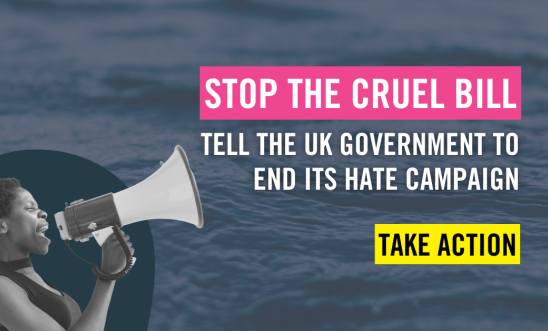
Refugee Ban Bill

Earlier this month the House of Commons passed the UK Government's Illegal Immigration or 'Refugee Ban' Bill at second reading - the latest but most inhumane and targeted attack on human rights we have seen. The Bill is expected to return to a ‘committee of the whole house’ - a mechanism used to bypass the usual more detailed and lengthier parliamentary scrutiny process - next Monday, 27th March 2023.
This harmful legislation is yet another huge step towards the UK completely abandoning its responsibilities under international law to respect and protect the universality of human rights. It will result in thousands more people being locked up in immigration detention and removed from the UK without consideration of their individual circumstances. There will be serious short and long term implications for children including unaccompanied children. Essentially, under this Bill, no asylum or human rights claim can ever be considered. That a person may be identified as a victim of human trafficking or modern slavery is to be irrelevant.
It is an astonishing attack on some of the most marginalised people in our society who are at risk of the most serious human rights violations, including torture and unlawful killing - and an abandonment of the responsibilities any human rights respecting nation should uphold. Amnesty has called for the Bill to be dropped in its entirety because it will place the UK outside of international law, create a charter for human exploitation and further stir up division and hate.
The UK Government has stated that the Bill relates only to reserved areas of power and that there is no place for the Scottish Parliament in its scrutiny. Human rights organisations in Scotland disagree and have this week called for the Scottish Government to lodge its own motion asking the Scottish Parliament to reject the Bill and refuse legislative consent.
Modern slavery and human trafficking, and the treatment of unaccompanied children seeking asylum are the clearest areas in which the Bill interferes with duties of Scottish ministers and public bodies. The UK is obligated to protect people from this exploitation, including by providing safety in this country rather than returning someone to a situation in which they are likely to be exploited all over again. The Bill provides a ban on providing that protection. Clause 23 modifies Holyrood’s Human Trafficking and Exploitation (Scotland) Act to remove the powers and duties of Scottish Ministers to provide support and assistance to survivors of trafficking, with very limited exceptions. In practice this means that the Scottish Government will be blocked from supporting people who have escaped violent criminal gangs, and survived torture and traumatic journeys to come to Scotland. Instead those people may find themselves detained or deported by the Home Office.
The Bill also cuts across the child protection responsibilities of Scottish councils towards unaccompanied children, giving powers to the Home Secretary to accommodate unaccompanied children, and to direct local authorities to look after or to cease looking after a child, giving five working days’ notice. Clauses 16-20 introduce a high risk that children may be removed from settled accommodation provided by local authorities in Scotland to institutional accommodation at very short notice - an outcome which is entirely unacceptable by human rights standards. It is an especially terrifying prospect given the knowledge that hundreds of children in the care of the Home Office have disappeared. Clause 19 empowers the Home Secretary to extend provisions to all nations in the United Kingdom, this includes the power to repeal or amend Holyrood legislation.
In its entirety, the UK Government’s Bill is not only alarming in its inhumanity, but fails to comply with core human rights standards including the UK’s own Human Rights Act and the Refugee Convention. The Bill is also firmly at odds with the direction of travel in Scotland to strengthen human rights protections, including the incorporation of the Convention on the Rights of the Child, and the Scottish Government’s proposed Human Rights Bill, which will incorporate further UN treaties. Despite the UK Government’s assessment that there is no requirement for legislative consent from Holyrood, there is no question that the Bill impacts on devolved areas and we welcome the Scottish Government’s work to examine how it relates to the legislative consent process.
Amnesty in Scotland has joined the Scottish Refugee Council, JustRight Scotland and 100 organisations calling on MPs to reject the Bill and in Scotland for the Government to:
- Bring a motion for debate to (a) withhold legislative consent for the Bill, (b) reject the Bill as a whole, and (c) outline a plan to protect refugees and trafficking survivors;
- To take all possible legal steps to ensure that Scotland complies with its obligations to protect victims of trafficking in Scotland, including legislation and litigation;
- To try to ensure that lone migrant children are not detained in Scotland, are cared for in accordance with Scots child law, with full access to their independent guardianship service entitlement and other related rights; and
- To reaffirm our commitments in Scotland to the universality of human rights, including compliance with the Refugee Convention and the European Convention on Human Rights, as well as concluding the incorporation of the UN Convention on the Rights of the Child and introduction of a new Scottish Human Rights Bill.
You can read the full statement below, and you can also urge MPs to take action on Amnesty UK's site: https://www.amnesty.org.uk/actions/stopthecruelbill
Our blogs are written by Amnesty International staff, volunteers and other interested individuals, to encourage debate around human rights issues. They do not necessarily represent the views of Amnesty International.
0 comments